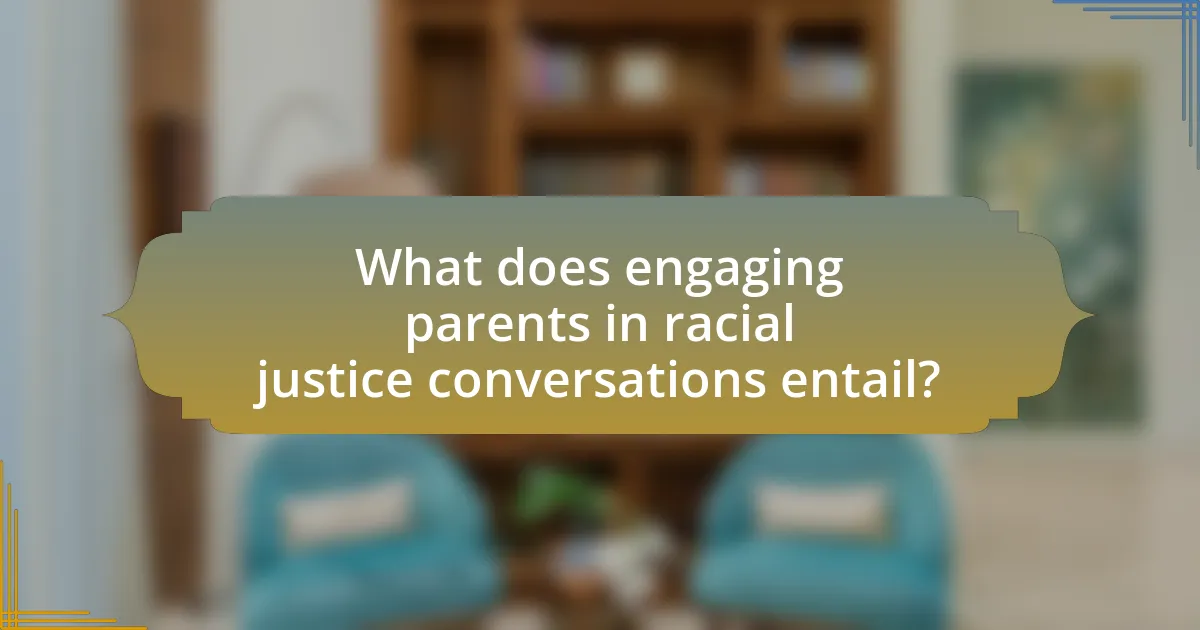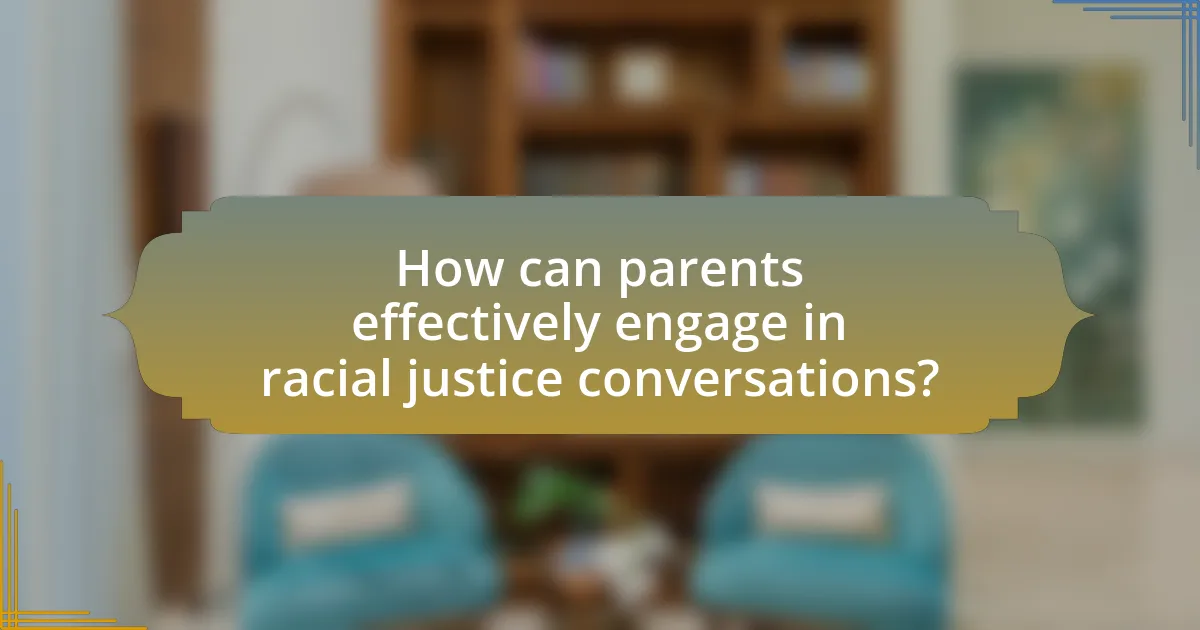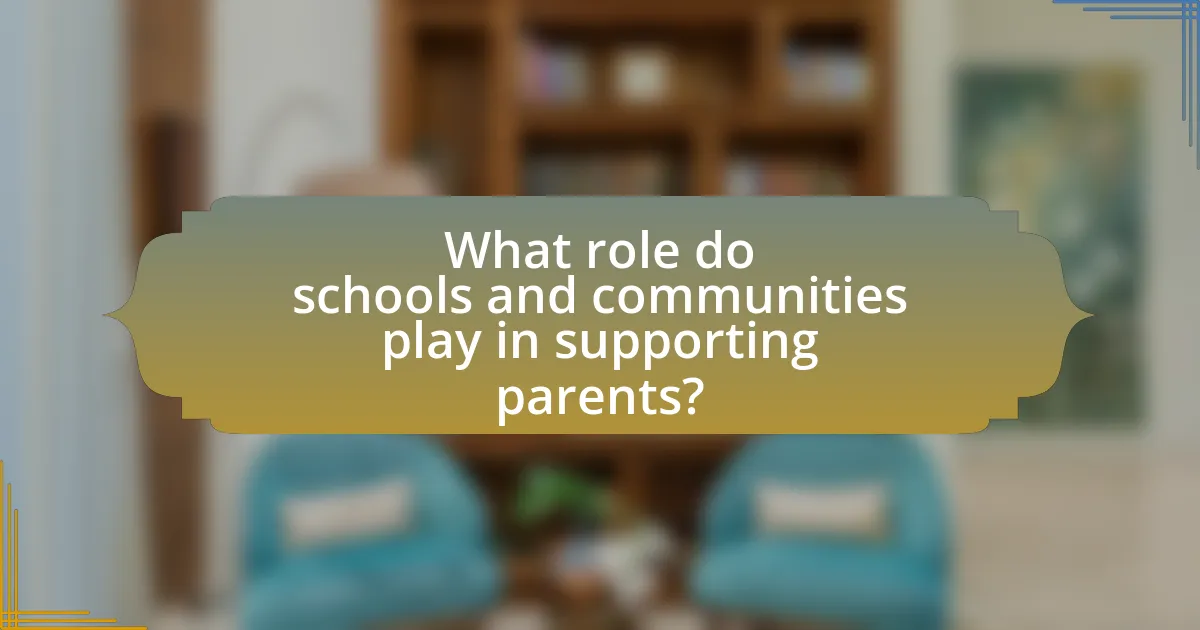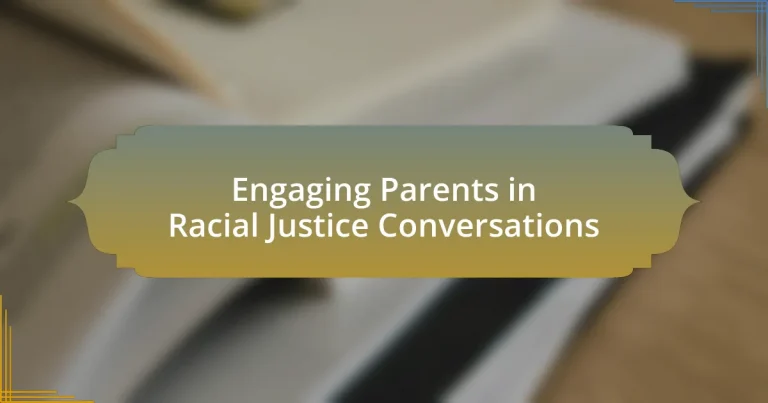Engaging parents in racial justice conversations involves facilitating open dialogues about systemic racism, equity, and social justice issues that impact children and communities. This article outlines the importance of parental involvement in these discussions, highlighting how it shapes children’s understanding of race and fosters community support for racial justice initiatives. It also addresses the challenges parents face, common misconceptions about racial justice, and strategies for initiating conversations. Additionally, the article emphasizes the role of schools and community organizations in supporting parents and enhancing their engagement in racial justice discussions.

What does engaging parents in racial justice conversations entail?
Engaging parents in racial justice conversations entails facilitating open dialogues that address systemic racism, equity, and social justice issues affecting their children and communities. This process involves creating safe spaces for parents to express their thoughts, share experiences, and learn about the historical and contemporary impacts of racism. Research indicates that when parents are actively involved in these discussions, they are better equipped to advocate for their children and contribute to community change, as evidenced by studies showing increased awareness and action among parents who participate in racial justice initiatives.
Why is it important to involve parents in these discussions?
Involving parents in discussions about racial justice is crucial because they play a significant role in shaping their children’s understanding and attitudes towards race. Engaged parents can reinforce positive messages about diversity and inclusion at home, which is essential for fostering an environment of acceptance and understanding. Research indicates that children whose parents actively discuss racial issues are more likely to develop a strong sense of social responsibility and empathy. Furthermore, parental involvement can lead to more comprehensive community support for racial justice initiatives, as families collectively advocate for equitable practices in schools and society.
What impact do parents have on children’s understanding of racial justice?
Parents significantly influence children’s understanding of racial justice by shaping their beliefs, attitudes, and behaviors through direct communication and modeling. Research indicates that when parents engage in discussions about race and social justice, children are more likely to develop a nuanced understanding of these issues. For instance, a study published in the Journal of Child Development found that children whose parents discussed racial issues were more aware of racial inequalities and more likely to express empathy towards marginalized groups. This highlights the critical role parents play in fostering an environment where racial justice is acknowledged and understood, ultimately impacting children’s perspectives and actions regarding social equity.
How can parental involvement shape community perspectives on racial issues?
Parental involvement can significantly shape community perspectives on racial issues by fostering open dialogue and promoting awareness among families. When parents actively engage in discussions about race and equity, they model inclusive behaviors for their children, which can lead to a more informed and empathetic generation. Research indicates that communities with high parental engagement in racial justice initiatives often experience a reduction in racial biases and an increase in support for equitable policies. For example, a study by the American Psychological Association found that children whose parents discuss racial issues are more likely to develop positive attitudes towards diversity, thereby influencing broader community norms and values.
What challenges do parents face in engaging with racial justice topics?
Parents face several challenges in engaging with racial justice topics, including discomfort with the subject matter, lack of resources, and fear of backlash. Discomfort arises from personal biases or a lack of understanding about systemic racism, which can hinder open discussions. Additionally, many parents may struggle to find appropriate educational materials or community support to facilitate these conversations, leading to feelings of isolation. Fear of backlash, whether from peers or within their own families, can also prevent parents from addressing these issues openly, as they may worry about being judged or criticized for their views. These challenges can create barriers to meaningful engagement in racial justice discussions.
What common misconceptions do parents have about racial justice?
Parents often hold the misconception that racial justice is solely about individual acts of racism rather than systemic issues. This belief overlooks the structural inequalities embedded in institutions such as education, healthcare, and law enforcement, which perpetuate disparities. For instance, studies show that Black students are more likely to be suspended or expelled than their white peers, highlighting systemic bias rather than just individual behavior. Additionally, some parents may think that discussing racial justice is unnecessary or that it will create division, yet research indicates that open conversations about race can foster understanding and empathy among children, preparing them to navigate a diverse society.
How can parents overcome their fears of discussing race with their children?
Parents can overcome their fears of discussing race with their children by educating themselves about racial issues and fostering open communication. Engaging in conversations about race can be facilitated by seeking resources such as books, articles, and workshops that provide insights into racial justice and the importance of these discussions. Research indicates that children are aware of race and racial differences from a young age, making it crucial for parents to address these topics proactively. For instance, a study by the American Psychological Association highlights that children as young as three can recognize racial differences, emphasizing the need for parents to create a safe space for dialogue. By practicing active listening and validating their children’s feelings, parents can build trust and encourage ongoing conversations about race, ultimately reducing their own fears and promoting understanding.

How can parents effectively engage in racial justice conversations?
Parents can effectively engage in racial justice conversations by initiating open dialogues that encourage questions and discussions about race and inequality. Research indicates that children are aware of racial differences by age three, making early conversations crucial for fostering understanding and empathy. Parents should create a safe space for their children to express their thoughts and feelings, using age-appropriate language and examples from current events or history to illustrate concepts of justice and equity. Engaging with diverse literature and media can also provide context and stimulate discussion, reinforcing the importance of racial justice in everyday life.
What strategies can parents use to initiate these conversations?
Parents can initiate conversations about racial justice by creating a safe and open environment for dialogue. This involves actively listening to their children’s thoughts and feelings, using age-appropriate language to discuss race and inequality, and sharing personal experiences related to racial issues. Research indicates that children as young as three years old can recognize racial differences, making early conversations crucial for fostering understanding and empathy. Additionally, parents can utilize books, media, and current events as discussion starters, which can help contextualize these conversations and make them more relatable. Engaging in community events focused on racial justice can also provide parents and children with shared experiences that facilitate deeper discussions.
How can parents create a safe space for open dialogue about race?
Parents can create a safe space for open dialogue about race by fostering an environment of trust and respect. This involves actively listening to their children’s thoughts and feelings about race without judgment, which encourages honest communication. Research indicates that children who engage in discussions about race with their parents develop a better understanding of racial issues and are more likely to express their own views openly. Additionally, parents can educate themselves on racial topics and share age-appropriate resources, such as books and articles, to facilitate informed discussions. By modeling openness and vulnerability, parents can demonstrate that it is acceptable to discuss difficult subjects, thereby reinforcing a culture of dialogue within the family.
What resources are available to help parents educate themselves on racial justice?
Parents can access a variety of resources to educate themselves on racial justice, including books, online courses, podcasts, and community organizations. Notable books such as “How to Be an Antiracist” by Ibram X. Kendi and “White Fragility” by Robin DiAngelo provide foundational knowledge on the subject. Online platforms like Coursera and edX offer courses on racial equity and social justice, enabling parents to learn at their own pace. Additionally, podcasts such as “1619” by The New York Times and “Pod Save the People” discuss racial issues and provide insights into current events. Community organizations like the NAACP and local racial justice groups often host workshops and discussions, fostering engagement and learning among parents. These resources collectively empower parents to understand and address racial justice effectively.
How can parents model racial justice in their daily lives?
Parents can model racial justice in their daily lives by actively engaging in conversations about race and demonstrating inclusive behaviors. By discussing racial issues openly with their children, parents can foster an environment of understanding and empathy. Research shows that children who are exposed to discussions about race are more likely to develop positive attitudes towards diversity (Pew Research Center, 2019). Additionally, parents can support racial justice by participating in community events that promote equality and by choosing to consume media that reflects diverse perspectives. This active involvement not only reinforces the importance of racial justice but also sets a practical example for children to follow.
What actions can parents take to demonstrate their commitment to racial equity?
Parents can demonstrate their commitment to racial equity by actively educating themselves and their children about racial issues and injustices. This includes engaging in open discussions about race, exposing children to diverse perspectives through literature and media, and participating in community events that promote racial equity. Research shows that children who are taught about diversity and inclusion are more likely to develop empathy and understanding towards others, which is crucial for fostering a more equitable society. Additionally, parents can support policies and initiatives that aim to dismantle systemic racism, thereby reinforcing their commitment to racial equity in both their family and community.
How can parents encourage their children to be advocates for racial justice?
Parents can encourage their children to be advocates for racial justice by actively engaging them in discussions about race and social justice issues. This can be achieved through age-appropriate conversations that highlight the importance of equality and the impact of systemic racism. For instance, parents can use current events, literature, or historical examples to illustrate these concepts, fostering critical thinking and empathy in their children. Research indicates that children who are exposed to discussions about diversity and inclusion are more likely to develop a strong sense of social responsibility and advocacy skills. By modeling inclusive behavior and encouraging participation in community events or organizations focused on racial justice, parents can further reinforce these values, helping their children understand the significance of their role in promoting equity and justice in society.

What role do schools and communities play in supporting parents?
Schools and communities play a crucial role in supporting parents by providing resources, fostering communication, and creating inclusive environments. Schools offer programs such as parenting workshops, counseling services, and access to educational materials that empower parents to engage effectively with their children’s education. Communities enhance this support through local organizations that facilitate parent networking, cultural events, and advocacy initiatives focused on racial justice. For instance, research from the National Parent Teacher Association highlights that schools with strong family engagement programs see improved student outcomes and increased parental involvement, demonstrating the effectiveness of collaborative efforts between schools and communities in supporting parents.
How can schools facilitate conversations about racial justice among parents?
Schools can facilitate conversations about racial justice among parents by organizing workshops and discussion forums that focus on the topic. These events can provide a structured environment where parents can learn about racial justice issues, share personal experiences, and engage in meaningful dialogue. Research indicates that community engagement initiatives, such as those implemented by the National Association for the Advancement of Colored People (NAACP), have successfully fostered discussions on racial equity, demonstrating the effectiveness of organized platforms for conversation. By providing resources, expert speakers, and a safe space for dialogue, schools can encourage parents to participate actively in discussions about racial justice.
What programs exist to support parental engagement in racial justice discussions?
Programs that support parental engagement in racial justice discussions include the “Racial Justice Parent Engagement Initiative” by the National Parent Teacher Association, which provides resources and training for parents to facilitate conversations about race and equity. Additionally, “Facing History and Ourselves” offers workshops and materials aimed at helping parents discuss historical and contemporary issues of race with their children. These programs are designed to empower parents with knowledge and tools to engage effectively in discussions about racial justice, fostering a more informed and active community.
How can community organizations assist parents in these conversations?
Community organizations can assist parents in engaging in racial justice conversations by providing resources, training, and support networks. These organizations often offer workshops and seminars that educate parents on racial issues, equipping them with the knowledge and tools necessary to discuss these topics effectively with their children. For instance, organizations like the National Parent Teacher Association provide materials and guidance on how to approach sensitive subjects, fostering an environment where parents feel confident in initiating discussions about race. Additionally, community organizations can create safe spaces for parents to share experiences and strategies, enhancing their ability to navigate these conversations.
What collaborative efforts can enhance parental engagement in racial justice?
Collaborative efforts that can enhance parental engagement in racial justice include forming partnerships between schools, community organizations, and families to create inclusive dialogue platforms. These platforms can facilitate workshops and discussions that educate parents on racial justice issues, fostering a shared understanding and commitment to advocacy. Research indicates that when schools actively involve parents in decision-making processes related to racial equity, it leads to increased parental participation and support for initiatives aimed at addressing systemic inequalities. For instance, the National Parent Teacher Association emphasizes the importance of collaboration in their “Family-School Partnerships for Racial Justice” framework, which highlights successful case studies where community engagement has significantly improved parental involvement in racial justice efforts.
How can parents partner with educators to promote racial justice education?
Parents can partner with educators to promote racial justice education by actively participating in school committees and advocating for inclusive curricula. This collaboration allows parents to voice their concerns and suggestions regarding the representation of diverse perspectives in educational materials. Research indicates that schools with engaged parents are more likely to implement effective racial justice initiatives, as highlighted in the study “The Role of Parents in Racial Justice Education” by the National Education Association. By attending workshops and community meetings, parents can also gain insights into effective teaching strategies and share their own experiences, fostering a supportive environment for both students and educators.
What role do local leaders play in fostering these discussions among parents?
Local leaders play a crucial role in fostering discussions among parents about racial justice by creating platforms for dialogue and providing resources. They facilitate community meetings, workshops, and forums that encourage open conversations, allowing parents to share experiences and perspectives. For instance, local leaders can collaborate with schools and community organizations to host events that focus on racial equity, thereby increasing awareness and understanding among parents. Research indicates that community engagement initiatives led by local leaders significantly enhance parental involvement in social issues, as seen in studies conducted by the National League of Cities, which highlight the positive impact of local leadership on community discourse.
What practical tips can parents use to engage in racial justice conversations?
Parents can engage in racial justice conversations by initiating open dialogues with their children about race and inequality. This can be achieved by using age-appropriate books and media that address racial issues, which helps to create a foundation for understanding. Research indicates that children as young as three can recognize racial differences, making early discussions crucial for fostering awareness and empathy. Additionally, parents should encourage questions and provide honest answers, creating a safe space for children to express their thoughts and feelings. Engaging in community events focused on diversity and inclusion can also enhance understanding and demonstrate active participation in racial justice efforts.
How can parents prepare themselves for difficult conversations about race?
Parents can prepare for difficult conversations about race by educating themselves on racial issues and understanding their own biases. Engaging with literature, documentaries, and resources that address systemic racism and historical context equips parents with knowledge to discuss these topics effectively. Research indicates that parents who actively confront their biases and seek to understand diverse perspectives foster more open dialogues with their children. For instance, studies show that children are more likely to engage in discussions about race when their parents model this behavior, demonstrating the importance of parental involvement in these conversations.
What are effective ways to address children’s questions about race and justice?
Effective ways to address children’s questions about race and justice include providing age-appropriate, honest answers, encouraging open dialogue, and using educational resources. Parents and caregivers should create a safe space for children to express their thoughts and feelings, which fosters understanding and empathy. Research indicates that children as young as three years old notice racial differences, and discussing these topics early can help shape their perspectives positively. For instance, studies show that children who engage in conversations about race are more likely to develop a nuanced understanding of social justice issues. Utilizing books, documentaries, and community resources can also enhance discussions, making complex topics more relatable and understandable for children.


